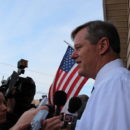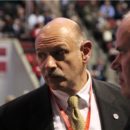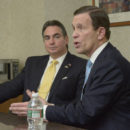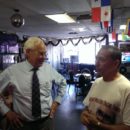The 2014 election is Republican Charlie Baker’s second race for the corner office. Four years ago, he ran and lost to incumbent Gov. Deval Patrick by 6 points.
VOTER GUIDE 2014: Who’s on the ballot?
MORE CANDIDATE PROFILES: Don Berwick, Martha Coakley, Mark Fisher, Steve Grossman
This time he’s running a different campaign and aiming for better results — focusing on his experience as a problem-solver, visiting urban centers, and meeting with more minority voters who traditionally vote Democrat.
A ‘Second Trip To The Plate’
On a recent morning, Baker visited the gateway city of Lowell for the 11th time this campaign season.
On this particular trip, Baker — whose income the last three years according to tax returns averaged around $750,000 — met street workers at the United Teen Equality Center.
As Baker circled the room shaking hands, the ’90s R&B song “Return of the Mack” welcomed him.
Once the pleasantries were over, he dived straight in to the quantitative questions. “So tell me, give me the numerator and the denominator,” he asked.
He was trying understand how many of the teens who go through this program end up back in prison, but the way it came out — as a math fraction — was a glimpse into the analytical brain behind his 6-foot-6 frame.
Baker went to Harvard as an undergraduate, where he also played basketball. His first job out of college was with the New England Council. He then joined the Mass High Tech Council.
A few years later he moved to the Midwest to pursue a MBA at Northwestern’s Kellogg School of Management. After graduating, he worked as a consultant for a couple of years before leaving to help launch the Pioneer Institute, a free-market think tank.
“We wanted to create a market-oriented think tank in Massachusetts,” he said, explaining the decision to create the organization. “We felt that most of the public policy research being done was classic one-team-on-the-field stuff.”
In 1991, Baker joined the Weld administration as undersecretary of health and human services. He quickly rose through the ranks, becoming secretary of health and human services and then secretary of administration and finance.
“I’ve been in a lot of meetings with Charlie … where I’ve sat for hours and everybody in the room probably had no idea what the speaker was talking about,” said Richard Tisei, who was Weld’s campaign chairman at then. “And Charlie would get up and within 30 seconds take a very complicated issue and pretty much boil it down to something everybody understood.”
Tisei and Baker have a long, tight-knit history. In the ’90s, they were colleagues. In 2010, they were running mates — Tisei was the Republican lieutenant governor candidate during Baker’s failed bid for the corner office.
That 2010 defeat is a loss Baker doesn’t scrutinize publicly.
“It’s my second trip to the plate and I think in some respects I’m just more familiar with the nature of campaigning,” he said.
Pundits say the 57-year-old is softer, nicer this time around, but Baker insists there is no “new” Charlie Baker.
“Hopefully many of us learn from the first time we do something and we do it differently and hopefully better the second time,” he said. “I certainly feel more comfortable as a candidate this time. I wear a tie less this time than I did the last time.”
His uniform these days often consists of a button down collared shirt paired with khaki pants. And that’s what he wore when we met at Phillips Park in his hometown of Swampscott.
“The reason I picked this spot here is because my wife and I spent a lot of time here as young parents becoming old parents,” he said looking out at the grassy lawn that serves as the town’s baseball and football field. “Our kids went from being young to being up and out of the house.”
He speaks nostalgically about his three children and his time as a selectman in Swampscott. Baker describes himself as fiscally conservative and socially moderate — the son of a Democratic mother and a Republican father.
“I’ve always been pro-choice,” he said. “I’m pro-marriage equality, always have been.”
But his primary focus this election is the economy.
He said one lesson he learned from his previous run was the need to simplify his message. He said four years ago he tried to talk about too many ideas simultaneously. This time, he’s trying to keep his agenda limited.
“For me, it’s really jobs, schools and communities. It doesn’t solve everything, but for most people it sure takes care of the things that matter most,” he said.
Baker is a results-oriented manager, with a desire to find ways to make government more efficient.
“I don’t think motive is enough,” he said. “And I think in most circumstances, in most situations, if you’re well-intended that’s great, but if you don’t know what the right questions to ask are or just the right lens to look at something through, your ability to solve whatever problem it is you’re trying to solve is probably gonna be limited. And a big part of public service is about problem solving.”
But Baker’s own legacy in public service is not problem-free.
In a recent Boston Herald radio debate, Democratic front-runner Martha Coakley questioned Baker’s competence overseeing the construction of the Big Dig.
“Charlie Baker — we can call him Charlie “Big Dig” Baker — talks about spending now against Democrats?” she asked. “He left behind that mess that wasn’t overseen … I came in as attorney general with federal, state, civil, criminal cost overruns … and we sorted that out.”
Baker said the federal government significantly reduced how much money it was willing to reimburse the state in the middle of the project. Still, he said, he worked with the Clinton administration to figure out a way to pay for the construction.
“The fact that this keeps coming up just says to me that the Democrats have no new ideas,” he said.
Wooing Voters Across The Aisle, And Women
Even with the digs about the Big Dig, a new WBUR poll shows more Democratic primary voters have a favorable opinion of Baker than an unfavorable one. To win this election, Baker needs to peel away some of those Democrats, especially women.
In 2010, he lost the women’s vote by 24 points. His wife, Lauren Baker, is trying to help chip away at that gender gap. She’s a lot more visible than she was four years ago.
“One of the things that we learned was that we didn’t really allow people to get to know Charlie as a person,” she said at a recent “Women for Charlie” phone banking night in Brighton. “I think voters, especially women, want to know about the kind of person that a candidate is. They want to know about is he a good father, is he a good husband, is he a good friend, is he a compassionate person? And those are the kinds of things that I can talk about.”
She lets others, such as Tufts University political science professor Jeff Berry, discuss her husband’s practical, political experience.
“He certainly has a good record as a budget manager in the Weld administration,” Berry said. “But Baker does evoke the patrician image of the Republican Party.”
In between his years in government and his unsuccessful bid for governor, Baker joined the private sector as the CEO of the state’s second largest health plan — Harvard Pilgrim Health Care. He’s credited with bringing the company back from the brink of bankruptcy and turning it into one of the nation’s top health insurers. And, most recently, he worked for the venture capital firm General Catalyst, based in Cambridge.
From Berry’s perspective, Baker’s private sector work should be an objective selling point in this governor’s race, but it depends how the story is told.
“Baker is going to run as a dynamic, problem-solving businessman,” he said. “And the Democrats are gonna portray him not as a bright, dynamic capitalist, but as a greedy plutocrat and someone who’s really out of touch with everyday Americans.”
In reality, Berry said, Baker fits into a long tradition of moderate Republicans. But the trouble is, registered Republicans are a dying breed in Massachusetts.
So in order to win, he’ll need a lot of votes from across the aisle.




